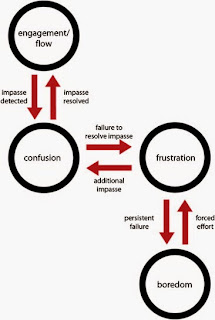Spring Week 3: The Role of Confusion in Learning
Confusion can be beneficial for learning?
The majority of students applaud professors for being able to explain complex concepts with step-by-step clarity, believing that their understanding is bolstered by their ability to follow a logical progression. As such, institutes such as the Khan Academy strive to create clear, concise, and easy-to-understand videos to teach everything from science to history. However, emerging research has been challenging this paradigm. To probe the effectiveness of confusion, D'Mello et al. looked at the role of confusion and its effectiveness in improving learning.
The authors begin by acknowledging that confusion may be detrimental in certain types of simple learning (e.g. memorization), but they assert that confusion is unavoidable in complex learning (e.g. problem solving). Thus, the authors probe the mechanistic role of confusion in comprehension over two sets of experiments involving Autotutor, a video displaying a "tutor agent" and a "peer agent" who sometimes agree and sometimes disagree about a specific topic.
To minimize confusion, a control was performed where the tutor agent and peer agent presented everything clearly and logically. Confusion was induced when either or both agents presented incorrect information. Learning was queried throughout the process. As the participants observed the dialogue, they were given opportunities to provide real-time "forced responses" to indicate their ongoing thoughts. Moreover, their facial expressions were recorded and after the experiment, the student was given an opportunity to describe their dominant emotion at specific timepoints during the experiment.
Their preliminary findings showed that although students answered more forced-response questions correctly in the non-confusing control, students who were more confused performed better on a post-test. This prompted a second study to analyze the extent of the students' learning by adding a final "near and far transfer" test as a function of confusion. Again, they found that students who were confused would perform better.
Of course, one could argue that students who were confused performed poorly initially and thus have more room for improvement, and the increase in scores is simply an artifact of the study. But regardless of the validity of the study, it is certain that confusion occurs, and the authors propose a "confusion pathway," detailing how confusion could be beneficial with proper guidance and perseverance, and how it could be detrimental if students lose interest.
Probing beyond the scope of the paper, the role of confusion could be linked to notions of self-worth. The US education system teaches students to link their ideas, grades, and academic performance to their identity; students are evaluated on academic performance. Therefore, we are inadvertently trained to view confusion as a personal failure. However, by empowering students to fail without impacting their self-worth, students may improve their learning of complex tasks. The role of the ego is further explored in a related Veritasium video.

Comments
Post a Comment